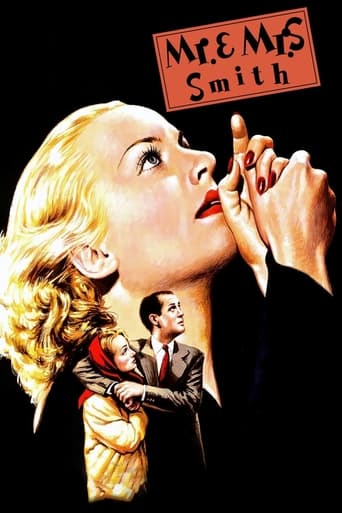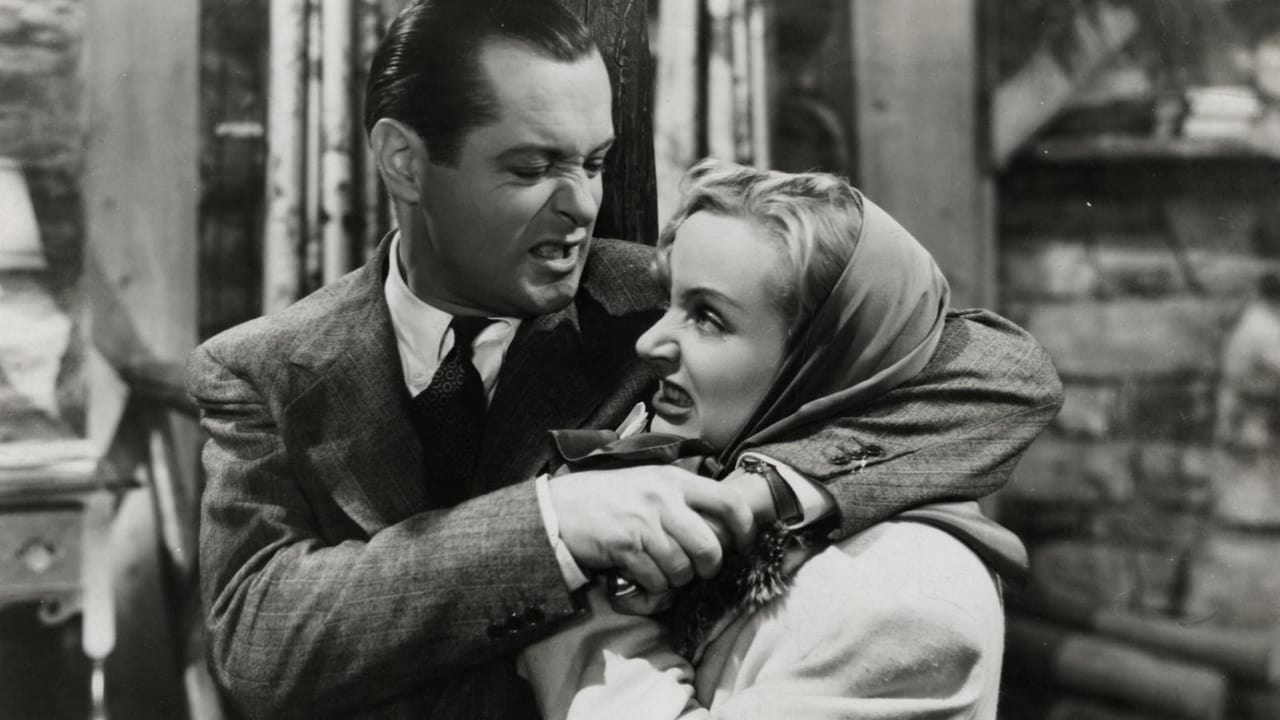Hitchcoc
Robert Montgomery and Carol Lombard, big stars of their time. Beyond those two, I wouldn't bother with this. It isn't that Hitchcock couldn't make a piece of fluff like this; he obviously could. It' just that the thing is so tired and dated and not really funny. It seems that at the time, there were all kinds of angry couples comedies, with the stars railing at one another. I think of "The Thin Man," but William Powell and Myrna Loy had charm and they never really though of leaving one another. This is a strain and I found that I could not care less for either of the couples. My advice is to leave each other and find someone else to make miserable.
edwagreen
Routine fanfare with famed director Alfred Hitchcock, who attempts to make a comedy in this 1941 farce.Robert Montgomery and Carole Lombard play a couple, who have a spat and later learn that their marriage is invalid.When Montgomery hesitates to marry Lombard, the fun starts with her throwing him out of the house, as he spends the rest of the film trying to win her back. Things become complicated when his partner,played by a lively Gene Raymond, attempts to take advantage of the situation and get Lombard for himself. Raymond is highly effective here and is memorable is his drunken scene.A fine supporting cast enriches the film with Jack Carson, a buddy of Montgomery, always at the health spa, attempting to give advice, as well as Philip Merivale and Lucile Watson, as Raymond's ultra- conservative parents from the south, both of whom are caught up in the various situations.With it all, it's pretty much routine.
judy t
If this movie had been directed by Leo McCarey or W.S. Van Dyke or any director other than Alfred Hitchcock, who herein strayed from his customary suspense genre, this film would be considered a superb achievement in sophisticated comedy.Carole Lombard is at her best, her performance here equaled only in 'To Be Or Not To Be', her next (and final) film. In this and "To Be" we see a mature comedy talent in its full manifestation. It's likely that this New and Improved Carole was what she would have continued to give her audiences had her career not ended as it did. The dizzy daffy dopey blonde of the superb 'My Man Godrey' in 1936 has finally grown up and stopped throwing temper tantrums. As a result, she's now, at last, fabulous. And some of the credit for this happy transformation must be due to Hitchcock's input. And Robert Montgomery is Carole's equally fabulous partner in this witty story of a husband who tells his wife that No, if he had it to do over again, he would not have married her,("You want me to be honest, don't you? Because we have a marriage where we respect each other.") and then proceeds to regret saying this. Montgomery was perfect, his performance stunning. Who could have bettered him? Not Gable, probably not Grant, but perhaps Melvyn Douglas or Willian Powell could have done as well, though both are a bit too slickly urbane.Every scene was hilariously wonderful. Carole putting on the suit she was wearing when proposed to, and saying "I don't understand how it could have shrunk just hanging in the closet." Or Montgomery's meeting in his office with the little man from Idaho who doesn't get to the point of his visit right off, and while he rambles, RM flips through his mail and nods, until the little man drops the bombshell and RM says, "What's that?" Or at Mama Lucy's when he says, "That cat knows something. I want a stomach pump." Here we are watching a master comedic actor in action.Supposedly Hitchcock later said he didn't have a high opinion of his work in this film, that he didn't understand Mr and Mrs Smith. Just goes to show that when you're a master director, you don't have to understand the characters. Just point the camera and let the actors do their stuff.
jdeamara
This screwball comedy has a naughty little premise behind it. A man discovers he isn't legally married and decides not to tell his wife. He'd rather be with her as if she were his mistress and have sex without the benefit of marriage. He finds the idea to be thrilling and exciting. Why he does isn't addressed. Perhaps the idea of defying society's conventions, or maybe the idea of gaining more power over his wife; a man can easily dump a mistress at any time; a wife, there's a long, messy divorce to deal with. Also, there's the sexual element behind it too; presumably sex with a mistress is more thrilling than sex with a wife.The wife finds out and dumps the husband for trying to turn her into that kind of woman. She dates his law partner, a true Southern gentleman who's entirely prim and proper and would never think of touching a woman before marriage. In the end, the wife finds their relationship unfulfilling, especially when he does not resort to violence to protect her honor. She dumps him and turns back to her hubby, a "real man." It's interesting that the movie ends with the husband getting exactly what he wants, sex with his wife before marriage. In effect, despite his wife's long protest, he wins; he now takes her as his mistress. This is a sex comedy where the man entirely gets his way; his sex dream is realized.Questions this film asks: does one really have to wait for marriage to have sex? Is it better to have a wife or a mistress? The film also offers insight into the different social standards of the higher and lower class, especially in the scene at the upscale nightclub where Montgomery is embarrassed to be with low-brow Jack Carson and the two low-brow dames Carson brings with him.Overall, the cast is good, though the three principles all show signs of premature aging. It's interesting to watch movies of the early 40s and see what's become of stars from the late 20s and early 30s. Some are still stars, like Montgomery and Lombard. Others are fading to character status like Gene Raymond. He's almost unrecognizable in dyed black hair as the type of character Ralph Bellamy plays so well in films like "The Awful Truth" and "His Girl Friday"; it's a far cry from Raymond's leading man days of the early 1930s. Saddest of all is to see what happened to another leading lady of the late 20s, Betty Compson. A star from the great 1928 film "The Docks of New York," she's truly unrecognizable here as the beat-up, low-class hag Gertie.Norman Krasna's script is serviceable, with a number of truly funny lines and scenes, mostly avoiding the sort of cliché-riddled, unfunny, idiotic cuteness that makes the 1943 film "Princess O'Rourke" so intolerable, a film for which Krasna inexplicably won the Academy Award for best screenplay. The first half of the film is the best half, before the focus shifts to Lombard and the boring Raymond. Hitchcock is serviceable too, though anyone could have directed this film. Obviously, Hitch didn't have the gift of an Ernst Lubitsch when it came to sex comedies. Neither did anyone else, and at least Hitch here makes no pretense as to having the "Lubitsch touch," unlike Billy Wilder, who failed numerous times in trying to recreate it, in movies like "Sabrina"(1954). "Mr. and Mrs. Smith" does deal with some domestic themes that Hitch is particularly fond of though, namely the battle of the sexes and the husband getting his way in the end.



 AD
AD








